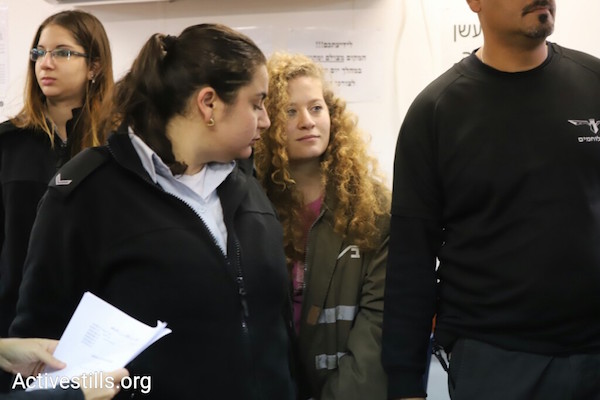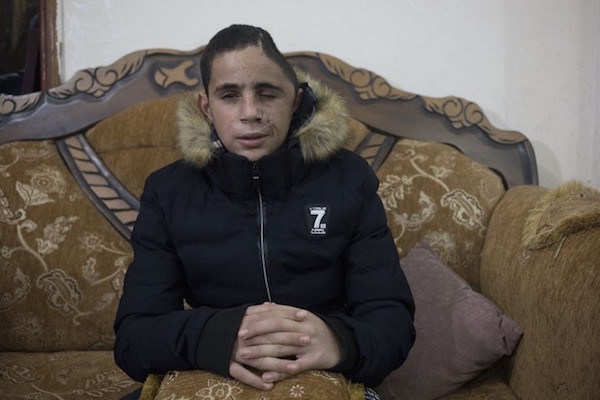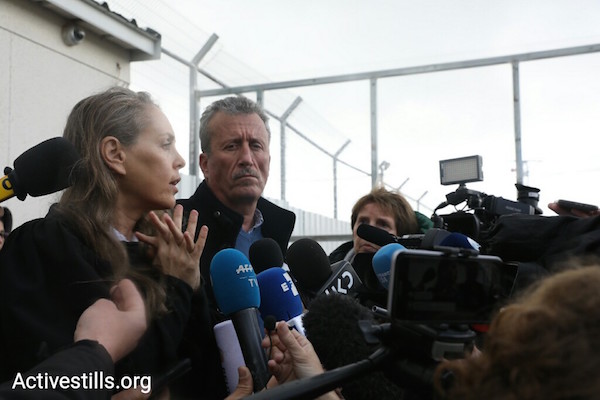Despite Ahed Tamimi’s request for her trial to be open to the public, military judge rules that it will take place behind closed doors.
By Oren Ziv

Dozens of diplomats, journalists, photographers, and supporters arrived at the Ofer Military prison Tuesday morning for the opening hearing in the trial of Ahed Tamimi, the 17 year old from Nabi Saleh. The judge, however, ruled that the trial would take place behind closed doors to protect Ahed’s interests, ordering everyone in the courtroom, except for Ahed’s family members to leave.
Tamimi was arrested on December 19 when the army raided her home in the middle of the night, following the publication of a video showing her attempting to push armed Israeli soldiers off of her family’s porch. She has been imprisoned since then. A military court denied bail to Ahed and her mother, Nariman, who was also arrested, ruling that they would remain in prison until the end of their trials.
Nariman was arrested the day after Ahed and is charged with incitement for livestreaming the video, which later went viral.
Ahed Tamimi faces 12 different charges in her indictment, regarding five different incidents. The charges related to the video are assault of a soldier, disrupting the work of a soldier, and incitement. That video was filmed shortly after soldiers shot Mohammed Tamimi, Ahed’s 15-year-old cousin, in the head with a rubber-coated bullet, severely wounding him; part of his skull was removed, and he was in a coma for several days.

The trials of minors are typically held behind closed doors to protect the minors. According to Attorney Gaby Lasky, who is representing Ahed, the best defense would be to open the trial to public scrutiny. Lasky intends to appeal the decision, arguing that it is Ahed’s right to decide whether the trial will take place behind closed doors or will be open to the public. Ahed was said to be planning to read a public statement at the hearing, which was made impossible by the judge’s decision.
“The court understands that this trial interests many people outside of the courtroom, that people know that her [Ahed’s] rights are being violated and that this trial is entirely unnecessary,” Lasky said following the judge’s decision. “The way to keep the story out of view of the public is to close the doors.”
“All of the proceedings until now were open to the public,” Lasky added. “Closed door proceedings are supposed to protect the minor, not the court. So when the parents and the girl herself want and think it’s important to have the proceedings open to the public, the decision to close the doors is not intended to protect Ahed but to protect the court from public scrutiny.”
Basssem Tamimi, Ahed’s father, said following the hearing that the decision to conduct proceedings behind closed doors was an attempt to mask that “there is no justice under occupation.” He added that the decision to close the hearing to the public was not intended to protect Ahed but the court.
“Protect Ahed from whom? From their soldiers? Our enemies are not the audience or the media,” Bassem said. “We don’t trust this court and we don’t trust this system. We are afraid that something will happen to Ahed and her mother.” Bassem said his sister died in military prison, which is why he fears for Ahed’s safety and wants the hearings made public.

The Israeli military court system’s treatment of minors has been widely criticized by international human rights organizations. In 2013, UNICEF published a report describing the poor treatment of Palestinian children held in Israeli military detention as “widespread, systematic, and institutionalized.” In 2015, despite concerns raised by the international community, the army suspended a pilot program meant to decrease the number of Palestinian children arrested in nighttime raids, like the one in which Ahed was arrested.
Tuesday’s proceedings were short. The military prosecutor read the charges against Ahed, but Lasky declined to respond, saying that she had not received the investigation materials, and would not respond to the charges until she had. The next hearing will take place in March.
“Today we made preliminary claims against the legitimacy of the occupation and this court,” Lasky said. She called the Ahed’s indictment “inflated and out of proportion, in some parts reflecting severe discrimination.”
Since her arrest, Ahed Tamimi has become an international symbol of Palestinian resistance to the occupation. Prominent actors, authors, and musicians signed a letter, published Monday by Dream Defenders, a Florida-based racial justice organization, calling for Ahed’s release. The signatories include Daniel Glover, Rosario Dawson, Cornel West, Angela Davis, and others.

